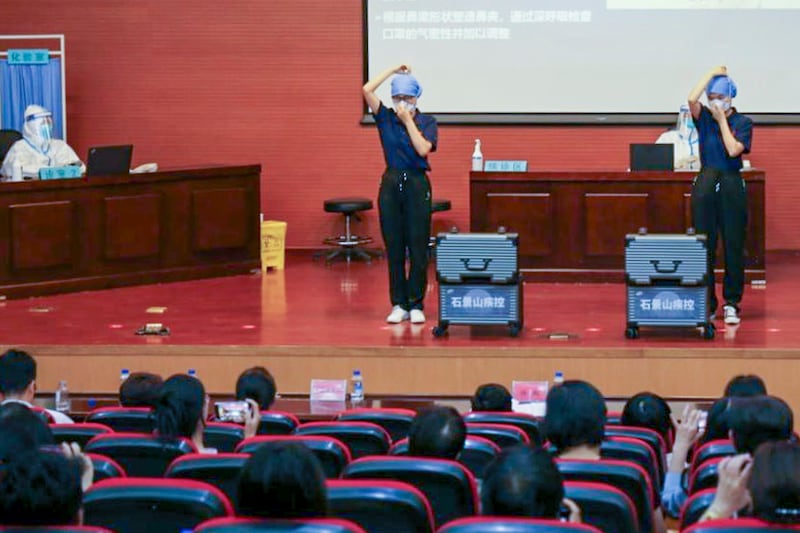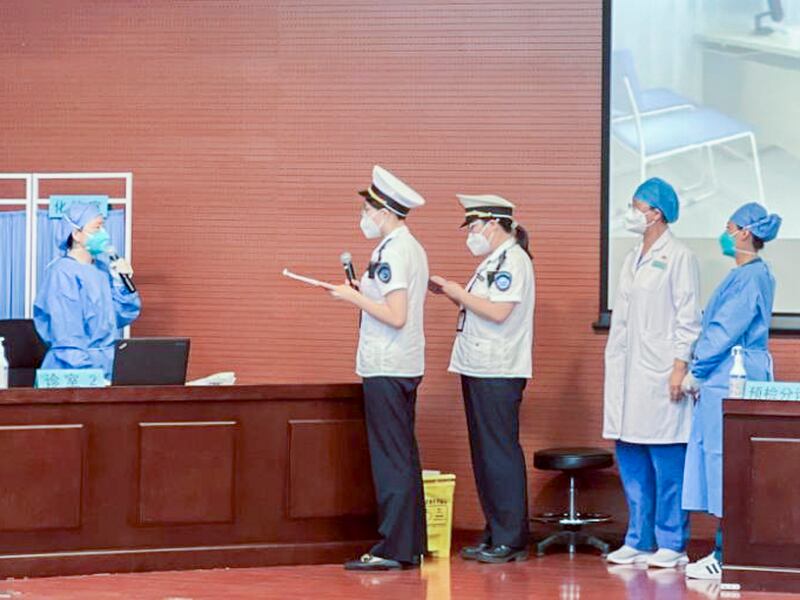China has stepped up emergency pandemic drills across the country and announced tighter surveillance of incoming travelers amid warnings that a more lethal and transmissible strain of the mpox virus is spreading internationally.
From Aug. 15, anyone arriving in China from countries and regions where mpox cases have been confirmed, or with symptoms like fever, headache, back or muscle pain, swollen lymph nodes or a rash is now required to declare their condition to customs authorities on entry, state news agency Xinhua reported on Friday.
sThe move comes after the World Health Organization on Wednesday declared mpox a public health emergency of international concern, sounding the alarm over its potential for further international transmission, with several African countries, Sweden and Pakistan all reporting confirmed cases of the deadly virus.
According to the U.S. Centers for Disease Control and Prevention, mpox is spread through "close contact," including sexual contact, and by touching contaminated surfaces. But The Lancet medical journal cited animal studies in March 2023 as showing that transmission through the air is also possible with some variants of the virus.
Data from the Africa Centers for Disease Control and Prevention cited by Xinhua showed that during the past week alone, more than 2,000 new mpox cases have been reported in African countries, with 38,465 mpox cases and 1,456 deaths across the continent since January 2022.
Worries about another lockdown
Authorities across China recently began emergency pandemic preparedness drills, resulting in photos of personnel clad from head to toe in white personal profective equipment, or PPE, and widespread concern on social media as people wondered if lockdowns were in the cards once more.
Local authorities rolled out emergency drills to prepare for "pneumonia of unknown cause" in Henan's Zhengzhou city, Zhangye in the western province of Gansu, southwestern Sichuan and the megacities of Beijing and Chongqing.

Similar drills happened ahead of the World Military Games in Wuhan in 2019, while COVID-19 was also initially described as "atypical pneumonia" when it tore through the central city of Wuhan in December 2019 before being named by the WHO as a global pandemic.
According to a post on X by citizen journalist "Mr. Li is not your teacher," the drills form part of a nationwide disease control and prevention action plan. The financial news service Yicai.com said the drills will be rolled out across 10 provinces by the end of August.
Photos from emergency infectious disease drills in Chongqing on July 4 included a photo of two people in full-body PPE collecting samples from two chickens, although there was no mention of avian influenza in the official report.
Some online comments referred to "post-traumatic stress syndrome" caused by the three years of lockdowns, compulsory quarantine and mass-testing of ruling Chinese Communist Party leader Xi Jinping's zero-COVID policy, which ended amid nationwide protests in late 2022.
"This is so we can be on a war footing again, right? I think if this happens again, the Chinese Communist Party will bring about its own downfall," said one comment, while another said: "We don't want to go through that again."
The first comment also alluded to a renewed wave of COVID-19 infections in China, adding: "It's still out there, and it's peaked again recently, but it's too hot to mention."
More behind the scenes?
Lin Xiaoxu, a former virology researcher at the Walter Reed Army Medical Center said there could be more going on in China currently than meets the eye, citing the government's track record in trying to cover up public health emergencies.
"Generally speaking, the government still conceals a lot of health information, especially during public health crises," Lin said. "I don't think they're doing these so-called emergency drills for no reason."
Chinese social media users seem to be thinking along similar lines.
A recent wave of COVID-19 infections in the southern province of Guangdong was listed among "hot topics" on Weibo on Thursday, claiming that the latest strain of the coronavirus was causing more severe symptoms in younger people.
Clicking on the search term refers readers to a video on the official account of the Southern Metropolis Daily newspaper and N Video, in which reporters visit Guangzhou Xinshi Hospital to investigate the recent spike in COVID-19 cases, quoting an expert as saying that the latest wave of the disease is hitting younger people with more pain and fever than previous variants.
Guangzhou's Yangcheng Evening News and the Luzhong Morning News both reported a sharp spike in the number of COVID-19 cases in July, with "more obvious symptoms" in young people.

Huang Yanzhong, a senior fellow for global health at the Council on Foreign Relations, said Japan, Europe and the United States are all currently seeing a wave of COVID-19 infections, and that cases in China appear to be following the same pattern.
"China is getting this too, but I don't see any pattern suggesting any essential mutations that would make it different from what is happening overseas," Huang told RFA Mandarin in an interview on Thursday.
Young people hit
He said the latest strains of COVID-19 have hit younger people harder everywhere, not just in China, likely due to impaired immunity caused by repeated infections.
"The number of young people infected is increasing, so I think that a large proportion of Chinese population has impaired immunity, with a lot of people who've been repeatedly infected, but the Chinese government basically doesn't report it much," Huang said.
He said a return to citywide lockdowns could happen if the Chinese authorities find the current wave is getting out of control.
"Given that the whole economy and the unemployment situation are very bad right now, the government could use a public health crisis as an excuse to impose more stringent social controls, as a way of clamping down on social unrest," Lin said.
But he said the current emergency drills may not relate to COVID-19 at all, citing anthrax as another possible target.
Officials reported on Aug. 2 that anthrax had been found at a beef cattle farm in Liaocheng city in the eastern province of Shandong, while an unconfirmed Weibo post reported anthrax near Shijiazhuang city in northern Hebei province.
Lin said the Center for Disease Control and Prevention in the northeastern province of Heilongjiang had warned local residents on July 3 to take precautions against the spread of anthrax during the flood season, adding that such warnings were "very unusual."
"My greatest suspicion is that there was a serious outbreak in Heilongjiang, but they didn't make it public," Lin said.
Translated with additional reporting by Luisetta Mudie. Edited by Malcolm Foster.
